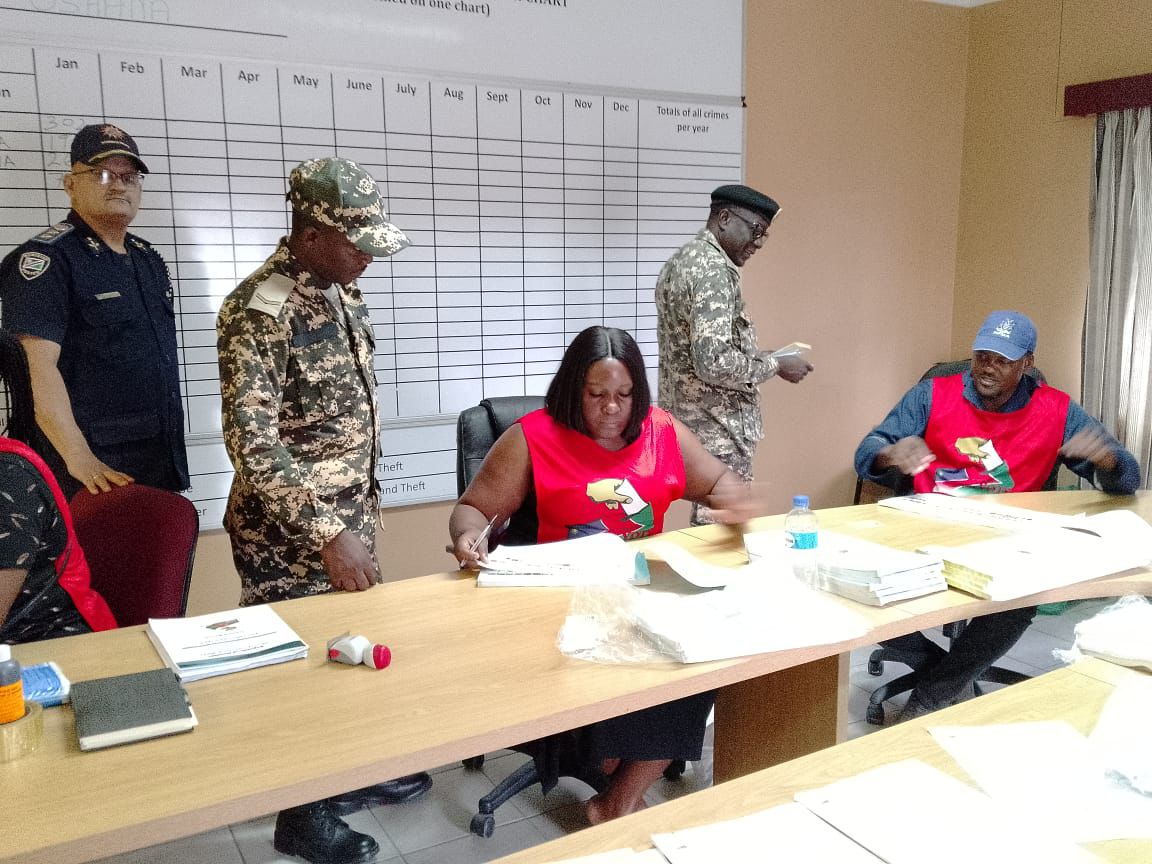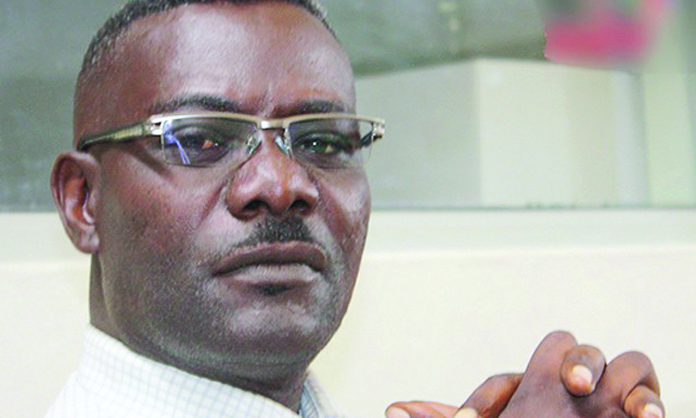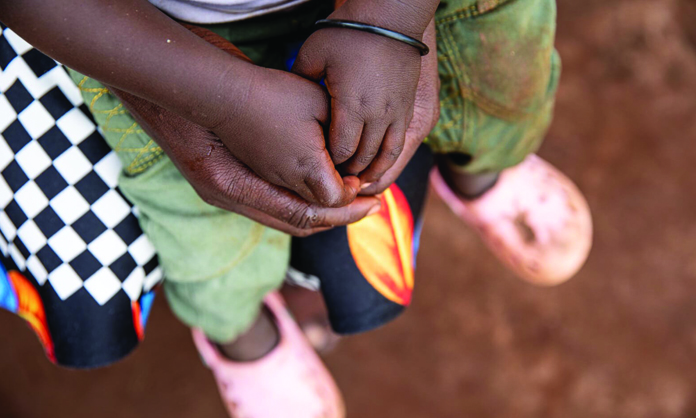THE son of a Namibian diplomat, posted until recently in Beijing, China, may be the first Namibian since Independence to face a death sentence after being implicated with a Zambian friend in the murder of a Russian girl in Beijing last year June, the Ministry of Foreign Affairs confirmed yesterday.
“Yes, it is true, there is such a case,” Foreign Affairs Permanent Secretary Veiccoh Nghiwete said an interview late yesterday. He said they did not know at this stage when the matter would go to trial in China, but confirmed that preliminary hearings had already taken place.Nghiwete said that the son of former senior diplomat Sackey Shikwambi, thought to be Nelson Shikwambi, aged 23 or 24, and a Zambian friend of similar age, were arrested in May or June last year, but that the Namibian Government was only recently alerted to the matter.CELLPHONE TANGO “From what we understand, the matter started with just a theft or robbery, and from there it became worse,” Nghiwete said.From what he has been able to gather on the case, the Russian girl suffocated from having her mouth and nosed taped shut, which led to the far more serious charges of rape and murder being added, he said.The incident appeared to have taken place in March last year already, but it was not yet clear who was responsible for doing what, Nghiwete added.”We are waiting for the law to take its course, to find out from the court who did what … it is not clear who is responsible, who caused the death of the girl,” he said.Shikwambi did not invoke diplomatic immunity over his son – who is thought to be the son of a sister – when the first charges were laid against Nelson Shikwambi, nor did he alert his line Ministry back in Windhoek at the time, Nghiwete said.He has since returned to retirement in Namibia, but could not be immediately reached for comment.A spokesperson for the Embassy of the People’s Republic of China in Windhoek, a Mrs Li, yesterday could only confirm that they were notified by the Namibian Ministry of Foreign Affairs of the case, but could not provide much detail.”We also did not know about the matter until we were notified of the case by your Ministry of Foreign Affairs quite recently,” Li said.”We have also asked our government for more information, but at this stage we do not know much more than you do.”The matter, described as “extremely sensitive” by another top Foreign Affairs official, could prove to be a major test for Namibian foreign policy vis-à-vis China, especially in respect of human rights and non-interference in domestic matters, China’s most popular diplomatic tool in Africa.Namibia banned the death sentence at Independence in 1990, but China routinely executes criminals, sometimes for relatively minor offences such as stock theft, hooliganism and repeated offences, robbery, drug trafficking and separatism.Amnesty International, the London-based international human rights organisation, has for years been campaigning to have the Chinese ‘Yanda’ (strike hard) policy reviewed, but with limited success.Chinese President Hu Jintao, when still the secretary of the Standing Committee of the Chinese Communist Party’s Central Political Bureau, was widely quoted in May 1996 as urging Chinese courts to implement the death sentence unsparingly.”Any crime which the law regards as serious should certainly receive serious penalties, and any crime which is punishable by the death penalty according to the law, should certainly receive the death penalty,” he was quoted by the Chinese Legal Daily on May 4, 1996.Chinese criminal law also prescribes the death sentence for corruption involving anything more than 20 000 to 30 000 yuan (about N$17 000 to N$25 000, at current exchange rates), and dozens of officials have been executed for corruption over the past year.Amnesty International (AI) said China tops their lists for legal (and sometimes not-so-legal) executions worldwide, and an official figure of 3 000 executions last year is thought to be hugely under-reported.News agency IPS in May this year reported a senior National People’s Congress member as saying in 2004 that China executed around 10 000 people every year.The pair is now thought to be facing a charge of murder under aggravating circumstances, a crime that routinely is punished with the death sentence in China under their Criminal and Criminal Procedure Act.”It is a very difficult position… we just hope that the death sentence will not be recommended by the Intermediate Court [in Beijing],” Nghiwete said.Under the Chinese legal system, one of Beijing’s many Intermediate Courts would first try the two accused on the charges, and impose a sentence.If they succeeded in appealing their sentence, the matter would be referred to a Higher Court, and eventually to a Supreme Court, according the local Chinese embassy spokesperson.Asked if Namibia would ask the Chinese government to let Shikwambi Jr.serve out any prison sentence in Namibia instead, Nghiwete said that depended on the role Shikwambi Jr.had played in the victim’s death, as well as on the available legal instruments in place.China and Namibia did not, as far as he was aware, have an extradition treaty in place, Nghiwete said.”All we can do at this stage is to wait and see what transpires in court.If the Intermediate Court recommends a death sentence, there is a ten-day period within which to appeal the sentence… but we need to find out exactly what had happened, who was responsible for doing what,” Nghiwete said.* John Grobler is a freelance journalist; tel. 081 240 1587He said they did not know at this stage when the matter would go to trial in China, but confirmed that preliminary hearings had already taken place.Nghiwete said that the son of former senior diplomat Sackey Shikwambi, thought to be Nelson Shikwambi, aged 23 or 24, and a Zambian friend of similar age, were arrested in May or June last year, but that the Namibian Government was only recently alerted to the matter.CELLPHONE TANGO “From what we understand, the matter started with just a theft or robbery, and from there it became worse,” Nghiwete said.From what he has been able to gather on the case, the Russian girl suffocated from having her mouth and nosed taped shut, which led to the far more serious charges of rape and murder being added, he said.The incident appeared to have taken place in March last year already, but it was not yet clear who was responsible for doing what, Nghiwete added.”We are waiting for the law to take its course, to find out from the court who did what … it is not clear who is responsible, who caused the death of the girl,” he said. Shikwambi did not invoke diplomatic immunity over his son – who is thought to be the son of a sister – when the first charges were laid against Nelson Shikwambi, nor did he alert his line Ministry back in Windhoek at the time, Nghiwete said.He has since returned to retirement in Namibia, but could not be immediately reached for comment.A spokesperson for the Embassy of the People’s Republic of China in Windhoek, a Mrs Li, yesterday could only confirm that they were notified by the Namibian Ministry of Foreign Affairs of the case, but could not provide much detail.”We also did not know about the matter until we were notified of the case by your Ministry of Foreign Affairs quite recently,” Li said.”We have also asked our government for more information, but at this stage we do not know much more than you do.”The matter, described as “extremely sensitive” by another top Foreign Affairs official, could prove to be a major test for Namibian foreign policy vis-à-vis China, especially in respect of human rights and non-interference in domestic matters, China’s most popular diplomatic tool in Africa.Namibia banned the death sentence at Independence in 1990, but China routinely executes criminals, sometimes for relatively minor offences such as stock theft, hooliganism and repeated offences, robbery, drug trafficking and separatism.Amnesty International, the London-based international human rights organisation, has for years been campaigning to have the Chinese ‘Yanda’ (strike hard) policy reviewed, but with limited success.Chinese President Hu Jintao, when still the secretary of the Standing Committee of the Chinese Communist Party’s Central Political Bureau, was widely quoted in May 1996 as urging Chinese courts to implement the death sentence unsparingly.”Any crime which the law regards as serious should certainly receive serious penalties, and any crime which is punishable by the death penalty according to the law, should certainly receive the death penalty,” he was quoted by the Chinese Legal Daily on May 4, 1996.Chinese criminal law also prescribes the death sentence for corruption involving anything more than 20 000 to 30 000 yuan (about N$17 000 to N$25 000, at current exchange rates), and dozens of officials have been executed for corruption over the past year.Amnesty International (AI) said China tops their lists for legal (and sometimes not-so-legal) executions worldwide, and an official figure of 3 000 executions last year is thought to be hugely under-reported.News agency IPS in May this year reported a senior National People’s Congress member as saying in 2004 that China executed around 10 000 people every year.The pair is now thought to be facing a charge of murder under aggravating circumstances, a crime that routinely is punished with the death sentence in China under their Criminal and Criminal Procedure Act.”It is a very difficult position… we just hope that the death sentence will not be recommended by the Intermediate Court [in Beijing],” Nghiwete said.Under the Chinese legal system, one of Beijing’s many Intermediate Courts would first try the two accused on the charges, and impose a sentence.If they succeeded in appealing their sentence, the matter would be referred to a Higher Court, and eventually to a Supreme Court, according the local Chinese embassy spokesperson.Asked if Namibia would ask the Chinese government to let Shikwambi Jr.serve out any prison sentence in Namibia instead, Nghiwete said that depended on the role Shikwambi Jr.had played in the victim’s death, as well as on the available legal instruments in place.China and Namibia did not, as far as he was aware, have an extradition treaty in place, Nghiwete said.”All we can do at this stage is to wait and see what transpires in court.If the Intermediate Court recommends a death sentence, there is a ten-day period within which to appeal the sentence… but we need to find out exactly what had happened, who was responsible for doing what,” Nghiwete said.* John Grobler is a freelance journalist; tel. 081 240 1587
Stay informed with The Namibian – your source for credible journalism. Get in-depth reporting and opinions for
only N$85 a month. Invest in journalism, invest in democracy –
Subscribe Now!






